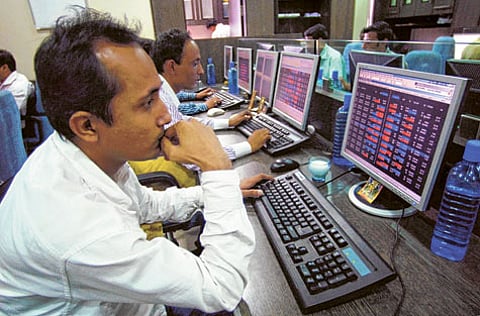Asian currencies to head northwards
Indian bank pledges liquidity to curb volatility

Dubai: Asian currencies are likely to resume gains as the region's relatively fast economic growth attracts funds and near-zero interest rates in the US deter investors from holding dollars, according to HSBC Holdings Plc.
"Standard & Poor's downgrade of the US credit rating on August 5 "further reaffirms" the medium-term bullish outlook for Asian currencies, notably the offshore yuan, the Singapore dollar, Malaysia's ringgit and Indonesia's rupiah," wrote currency strategists Paul Mackel and Daniel Hui in a research note published yesterday.
Analysts favoured Asian emerging market currencies "From an foreign exchange strategy perspective, we recommend that investors maintain core Asian currencies excluding the yen longs on the view that ‘risk-off-related turbulence is likely to be temporary and replaced in short order by broad-based US dollar weakness," Standard Chartered wrote in a note yesterday.
In Asia the yuan strengthened 0.14 per cent to 6.4265 per dollat as of 5:02pm in Hong Kong, while the Singapore dollar gained 0.44 per cent to $1.2144, according to data compiled by Bloomberg.
Both currencies rose for the first time in five days. The ringgit slid 0.15 per cent to 3.0195, a fifth straight decline, and the rupiah appreciated 0.39 per cent to 8,541.
With the gain in currencies more central banks including Japanese central bank is expected to intervene in the foreign exchange markets. India's central bank pledged to provide "adequate rupee and forex liquidity" to curb "excess volatility" in interest and exchange rates as stocks and the nation's currency fell after the cut in the US credit rating.
"We will respond quickly and appropriately to the evolving situation," the Reserve Bank of India said in an e-mailed statement yesterday.
"As of now, the banking system does not face any liquidity pressures."
The rupee fell and bonds climbed after Standard & Poor's last week downgraded the US's AAA rating for the first time.
The Reserve Bank said that while "downside risks" to India's economic growth may have increased amid weakness in the global economy, "they are likely to have limited impact."
"The RBI's move indicates it's vigilant and concerned about financial stability in markets," said Sonal Varma, a Mumbai-based economist at Nomura Holdings Inc.
"Domestic growth remain strong, though there are heightened concerns after the recent global developments."



